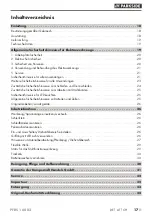
PFBS 160 B2
■
10
│
GB
│
IE
Using the grip ring with LED light
♦
Unscrew the union nut anticlockwise off the
thread.
♦
Screw the grip ring with LED clockwise onto
the screw thread.
♦
Move the ON/OFF switch of the LED light to
the position "I" to switch it on (see fig. C).
♦
Move the ON/OFF switch of the LED light to
the position "O" to switch it off again.
Notes on working with materials/
tools/speed range
■
Use the milling bit for working on wood, plastics
and plasterboard at maximum speed.
■
Calculate the rotational speed range for working
on zinc, zinc alloys, aluminium, copper and
lead by trying it out on test pieces.
■
Use a low rotational speed for work on plastics
and materials with a low melting point.
■
Use a high rotational speed for working on
wood.
■
Carry out cleaning, polishing and buffing work
in the middle range.
NOTE
►
The milling bit is not suitable for steel or
iron. Suitable products are available in stores.
The following are recommendations only and not
binding. When carrying out practical work, carry
out your own tests to see which tool and which
settings are ideal for the material you are working
on.
Set a suitable rotational speed
Number on the
speed control
Material being worked
1
Plastics and materials
with a low melting point
2–3
Stone, ceramics
4
Soft wood, metal
5
Hardwood
Max.
Steel
Select suitable accessories for the appropriate rotational speed
WARNING!
■
Never exceed the specified maximum rotational speed!
Speed
control
Accessories
Speed
MAX
Cutting disc
grinding wheel /
abrasive belts /
milling bits /
engraving bits /
grinding bits /
cutting discs
40000 rpm
5
4
3
Polishing attach-
ments /drills
2
Metal brush /
synthetic brush
1
0
0 rpm
Summary of Contents for PFBS 160 B2
Page 3: ...C A B 14b ...
Page 57: ...PFBS 160 B2 54 FR BE ...
Page 127: ...PFBS 160 B2 124 SK ...
Page 197: ...PFBS 160 B2 194 HU ...














































